Thank you for your interest in speaking at the 2014 Travelers Conference. We are now accepting proposals.
The post Test Conference Speaker Submission appeared first on The Gypsy Nurse.
Thank you for your interest in speaking at the 2014 Travelers Conference. We are now accepting proposals.
The post Test Conference Speaker Submission appeared first on The Gypsy Nurse.
MNA Legislative Update April 5, 2014
Minimum Wage
Legislative leaders are still in discussions about raising the minimum wage (HF92). Both the House and Senate agree on raising the wage to $9.50, but only the House currently supports including an annual inflationary increase in the legislation, called indexing, that allows minimum wage workers to keep up with the rising costs of food, housing, and transportation. Last week the Senate introduced a bill that would have asked the voters to decide on the minimum wage and inflationary increases, but this week the author, Sen. Ann Rest, withdrew the bill. MNA supports an increased minimum wage with an automatic inflationary increase so low wage workers can catch up and keep up.
Please use the MNA Grassroots Action Center to contact your Senator and ask him or her to support an increased and indexed minimum wage.
Synthetic Drugs
Rep. Erik Simonson’s bill to outlaw synthetic drugs (HF2446) has passed through many committees already and passed the House Ways and Means Committee on Tuesday and will move on to a floor vote. Senate companion (SF2028) is waiting for a hearing in Finance Committee, which is probably the last committee stop before a floor vote. MNA supports this bill as an important step in reducing the impact of synthetic drugs on our communities.
Public Employee Relations Board
A bill to establish a Public Employee Relations Board (HF3014)is moving as legislators on the House Ways and Means Committee passed it on Tuesday. The Senate Finance Committee will hear it next week. The House Ways and Means Committee amended the bill to include employees of charitable hospitals, including many MNA nurses. This legislation creates a board where public employees could bring unfair labor practice complaints, rather than bringing them to district court, which would mirror the private sector process. Since the district court process is cumbersome and expensive, this new board would save employers and employees significant amounts of money.
Women’s Economic Security Act
Legislation to address discrimination and economic inequality that women face (HF2536) was passed by the House Ways and Means committee on Wednesday and is on the way to the House for a floor vote. In the Senate, we are still waiting for a floor vote to be scheduled. MNA supports this legislation because women make up half the state’s workforce and providing them with equal opportunities and pay is critical to our state’s economic future. Anti-Bullying Bill
The full Minnesota Senate voted on the Safe and Supportive Schools bill (HF826) on Thursday. After six hours of debate and many amendments from opponents, the bill passed. It now goes back to the House for a final vote, which could happen early next week.
Minnesota currently has the weakest anti-bullying law in the country. MNA supports the bill, which will provide schools with the tools to prevent and intervene in cases of bullying so that all of our students feel safe and supported when they come to school.
State Employee Salary Supplement
The Governor recommended an increase in compensation funding for the Department of Human Service’s Direct Care and Treatment State Operated Services programs and the Minnesota Sex Offender Program. The programs are experiencing compensation pressures of negotiated salary increases and increased costs of employer-paid benefits for current employees. This increase would allow the programs to meet these increasing personnel costs and continue to deliver care to their clients.
This increase was not included in the House and Senate’s Health and Human Services omnibus bills. We’re monitoring negotiations about these and continuing to talk to legislators about the need for this funding, and we think there is still a chance for the funding to be included in the final package.
5% Campaign
Funding to give an increase to long term care workers who do not work in nursing homes was included in both the House and Senate Health and Human Services omnibus bills. The bills include language that would mandate the majority of the funds go directly to workers. We expect this will be a part of the final Health and Human Services finance package.
Nurse Licensure and Discipline
The bills proposing changes to the Health Professionals Services Program (HPSP) and how the Board of Nursing handles nurses with substance use disorders and drug diversion are moving through the legislative process (HF1898 and HF1604) . Our priorities remain reflected in the bills – protecting patient safety, treating substance use disorder as a disease, encouraging nurses with substance use disorders to seek rehabilitation treatment, and protecting nurses’ private medical and legal information.
Community EMT
MNA was very concerned about legislation that would create a Community Emergency Medical Technician position that would be reimbursed under Medical Assistance (HF3288/SF2862). The role of the Community EMT would be to provide interventions intended to prevent avoidable ambulance transportation or emergency department use. This could include the performance of minor medical procedures, initial assessments within the Community EMT Scope of Practice, care coordination, diagnosis related to patient education and chronic disease management monitoring. While we recognize that there are gaps in our medical system, MNA opposed this legislation because Community EMTs would not be fully trained in nursing care, therefore not suitable to provide this type of care to the community. This new role could encourage a decrease in public health nursing, an area that is already facing a shortage. We raised these concerns with legislators, and the bill does not appear to be moving this session.
From Maine to California, nurses, students, HIV/AIDS and community activists, took to the streets today calling on Congress to fulfill the quest of Dr. Martin Luther King Jr.’s fight for economic justice by enacting a tax on Wall Street speculation to fund efforts to reverse inequality.
“The Inclusive Prosperity Act would make Dr. King proud,” said Rep. Keith Ellison at a kick off press conference in Washington against the backdrop of the U.S. Capitol.
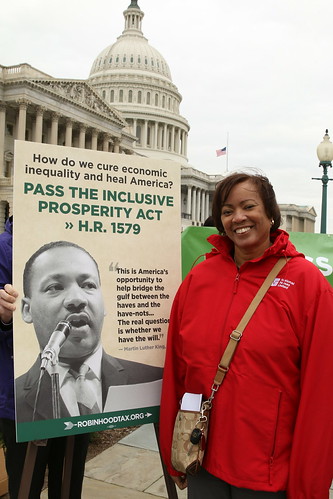
National Nurses United Vice President Sandy Falwell, RN
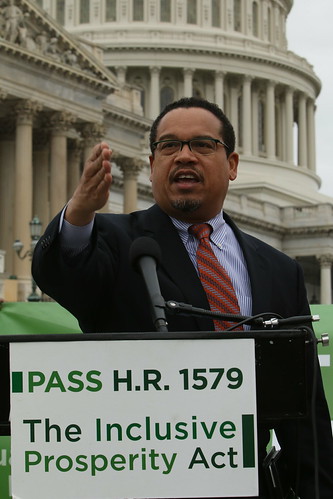
Rep. Keith Ellison, author of HR 1579
“This is a holy day, a sacred day,” Ellison continued. April 4 is a day America remembers Dr. Martin Luther King Jr. It was on this day 46 years ago that he was assassinated, slain while in Memphis to provide support to city sanitation workers as part of a campaign for worker justice and to fight poverty.
And on this day in 2014 Rep. Ellison spoke of the Robin Hood Tax, embodied in his bill, H.R. 1579, a sales tax on Wall Street speculative trading that would create hundreds of billions of dollars a year in revenue for communities in need, a way to attain the economic equality Dr. King was seeking.
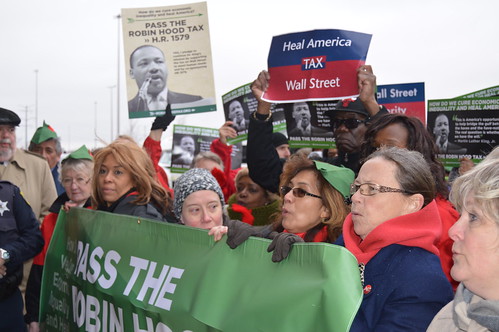
Big gathering in Chicago for the Robin Hood tax for economic justice
Vigils to honor Dr. King’s legacy, and call for enactment of HR 1579 were also held at Congressional offices in 24 cities from coast to coast, and letters of support delivered to Congress members at 44 other offices this day as well.
In Washington, Bill Lucy, president emeritus of the Coalition of Black Trade Unionists, who was with King in April, 1968, stood today outside the Capitol with Ellison remembering King and calling for passage of the Ellison Bill.
“The Inclusive Prosperity Act really is a vehicle to continue the work of Martin Luther King Jr.,” said Lucy. “The sanitation workers of Memphis wanted decency and dignity,” he remembered. “Keith Ellison wants economic fairness. I applaud him.”
“The originators of the idea for the tax are nurses,” said Ellison, introducing Sandy Falwell, RN, a national vice president of National Nurses United.
“Registered nurses are on the front lines of this calamity as many of the patients we care for in hospitals around the country are coming to us with multiple illnesses aggravated by poverty and a delay in seeking care because they simply cannot afford it. They have to choose to eat or get health care,” said Falwell. “Too many people in this country are forced to choose whether to take medications or try to pay their rent, and in a country such as ours with such tremendous wealth, this is unconscionable.”
“America is our patient,” declared Falwell. “The Inclusive Prosperity Act is a vital step to funding programs Dr. King stood for.”

‘Heal Detroit’ say nurses, activists in Detroit
Falwell and others talked of jobs to rebuild a crumbling infrastructure, quality schools and healthcare, retirement with dignity, funds for a clean environment, all goals of the H.R. 1579.
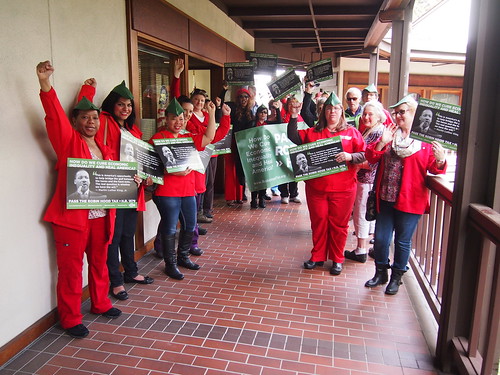
Nurses, activists call on Rep. George Miller, Concord, Ca to support the Robin Hood tax
“We will push this forward. The Robin Hood Tax is real hope for a just economy,” added Rep. Barbara Lee, a co-sponsor of HR 1579 who was also present outside the Capitol to remember Dr. King this day. “The American dream,” she warned, “is turning into an American nightmare.”
In recent weeks, investigations of high speed trading on financial markets have underscored the negative effects these trades have on the U.S. economy. The Wall Street Journal reported in March that high speed trading programs “can encourage traders to engage in strategies that boost volumes but harm other investors.”
High speed trades are also linked to price rises in gas, food and other essentials. H.R. 1579, say economists, will serve to diminish this harmful trading. That was echoed at today’s press conference. Said Ellison, “H.R. 1579 will make super fast trades unprofitable.”
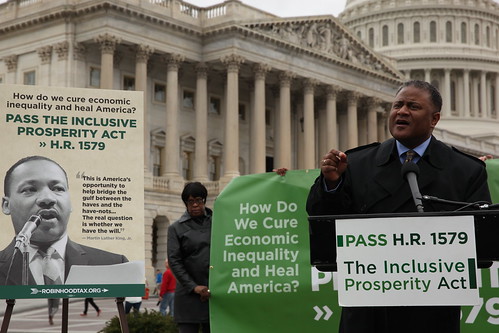
Rev. Rodney Sadler, Moral Mondays leader
Reverend Rodney Sadler was present, as well. A leader of the “Moral Mondays” in North Carolina, he spoke of the struggle for justice in that state. “Will we allow the poor to be overlooked, forgotten and invisible?” asked Sadler. “Prosperity is something that should be inclusive. The Inclusive Prosperity Act will go a long way to meet needs in housing, employment, education, for veterans and for the elderly.”
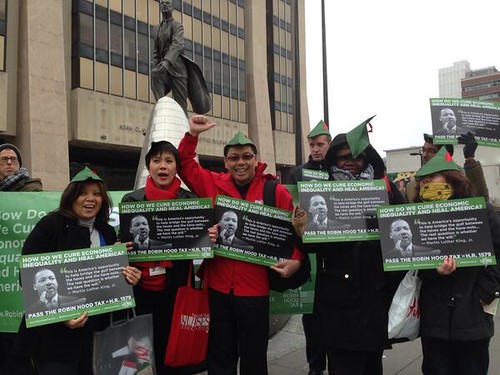
New York City activists call for Robin Hood tax
Amanda Lugg came to the event from Harlem where she is director of advocacy for the African Services Committee. She is also a board member of Health GAP. H.R. 1579 is committed to raising U.S. contributions to international efforts to research and treat HIV/AIDS. “We can end the AIDS epidemic in 30 years,” said Lugg. “Half the people who need AIDS medicine go without. That ain’t right.”
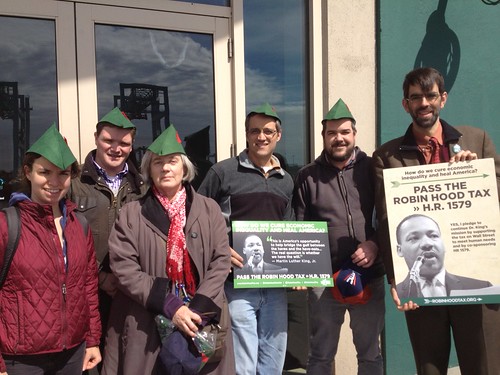
Boston vigil
“The Robin Hood Tax,” Lugg said, “can save lives and restore human dignity.” She reminded the press conference that, for 11 nations in Europe, next month is the start date for their Robin Hood Tax.
The time to join in is now.
Check out this video of testimony delivered by North Adams Regional Hospital ED nurse Diane George delivered at a State House Hearing on March 24, just one day …
Sunset
The post Travel Nurse Inspiration in Photo’s: Pacific beach, San Diego, CA appeared first on The Gypsy Nurse.
Management Finally Agrees to Reimburse Nurses for Increased Healthcare Costs for 2012 and 2013
After three arbitration decisions by two separate arbitrators and a federal judge’s order, hospital management has entered into a settlement agreement with nurses represented by National Nurses United to repay nurses for nearly all increases in out-of-pocket costs and premium increases for calendar years 2012 and 2013. The reimbursements will be applicable to NNU members at Washington Hospital Center who enroll in the company’s Care First healthcare plan. This settlement comes after MedStar Health “materially diminished” our health benefits by increasing out-of-pocket costs and premiums in an effort to drive nurses to use MedStar Health exclusively for health services. These changes had the effect of reducing the viable healthcare options available to nurses and their families rather than allowing nurses to use their professional judgment when seeking care for their families. This ruling is a credit to the strength of our NNU contract, which requires management to maintain certain standards for registered nurses, and the perseverance of NNU nurses who demanded that management follow our collective bargaining agreement.
This information also availble in PDF here >>
Frequently Asked Questions
Q. Why will NNU nurses receive reimbursements for healthcare expenses?
A. Two arbitrators ruled that Washington Hospital Center management violated our collective bargaining agreement by “materially diminishing” our health benefits. The arbitrators ordered management to repay nurses for changes to the healthcare plan in calendar years 2012 and 2013.
Q. When will nurses begin receiving checks?
A. Checks will be issued in two steps. Nurses will first be reimbursed for calendar year 2012 after NNU is provided with data that details the total reimbursement due to each nurse. According to the agreement, NNU will be provided this information by the end of the week. Nurses will be reimbursed for calendar year 2013 after NNU is provided with similar information about the amounts to be reimbursed to nurses. That information is due by May 15, 2014.
Q. Do I need to do anything to receive a check?
A. Nurses will not need to do anything to receive a check but nurses should study the reimbursements carefully to make sure that you are being reimbursed for the full amount due. If a nurse believes that his or her reimbursement is incorrect, the nurse will need to fill out a HIPAA release form so that NNU can investigate the discrepancy.
Q. Does this settlement resolve our dispute over healthcare changes in calendar year 2014?
A. No, we are still in the process of disputing changes made for the current calendar year.
Q. Doesn’t SEIU Local 722 have similar contract language to dispute healthcare changes? Will our co-workers represented by Local 722 receive reimbursements?
A. Yes, Local 722 has similar contract language that allows the union to challenge changes made to the health plan. Local 722 members should contact their union leadership in order to inquire about their reimbursements.
Details of the Reimbursement Agreement between NNU and WHC can be found here in PDF >>
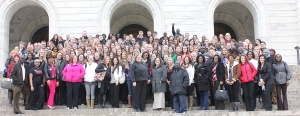 On Thursday, April 3, for the seventh consecutive year, the Minnesota Nurses Association hosted students from nursing schools throughout the state for a lesson in advocacy that takes them beyond their bedside responsibilities.
On Thursday, April 3, for the seventh consecutive year, the Minnesota Nurses Association hosted students from nursing schools throughout the state for a lesson in advocacy that takes them beyond their bedside responsibilities.
350 students and instructors, representing 14 different schools of nursing attended the day-long event that kicked off with a morning meet & greet with MNA members leaders. A comprehensive orientation followed, providing students insights about policy issues facing legislators in which nurses have a keen interest, including Nurse Licensing, Monitoring and Discipline; Minimum Wage; Mandatory Flu Vaccine; Department of Health Study of Staffing and Patient Outcomes; and Health Care for All.
The students were inspired by MNA’s Chairperson for its Commission on Governmental Affairs, Mary Turner, RN who encouraged them to become nurse activists. “I know I have influenced a legislator’s perspective,” said Turner. “I can change a vote. I know I have the power to inspire and champion a law to protect my practice and make my patients safer. All because I talk to my legislator – who represents the neighborhoods and families where I live.”
A panel of former legislators and a Deputy Commissioner also provided valuable hands-on tactical advice for approaching legislators. Especially unique was the fact this panel consisted of nurse role models – former Representative Maria Ruud, RN, CNP, along with Diane O’Conner, RN, formerly MNA’s lobbyist and Director of Nursing Practice and currently Deputy Commissioner of Higher Education. Rounding out the panel was former Representative Jeremy Kalin who served with Ruud in the Minnesota House from 2006 – 2010.
Justin Ettl, a student at Metropolitan State University in St. Paul, believes that attending the program will benefit his patients and help him to become a better nurse. “This experience gives us the opportunity to get involved with the legislature and really get our voices heard,” said Ettl.
For Jessica Spencer who graduates from St. Cloud State University in May, speaking up to elected officials is just as important as speaking up at work. “It’s important to have a nurse on board to help advocate for patient safety,” said Spencer. “What we do here and now reflects on their health care for the future.”
Andrea Nyquist, also from St. Cloud State, was impressed by the power of collective action embodied in the Minnesota Nurses Association. “I love seeing how nurses work together to get things done,” she said.
Schools represented at MNA’s 2014 Student Day on the Hill were:
The Following is a Guest Article by Jay Lane This life we are still getting used too. A life of seemingly endless conversations. Meaningful exchanges of our days events. Sharing the good with the bad like many married couples all over the world. Discussing current events near and far. There is nothing routine, monotonous or […]
The post From a Travel Nurse Husband appeared first on The Gypsy Nurse.